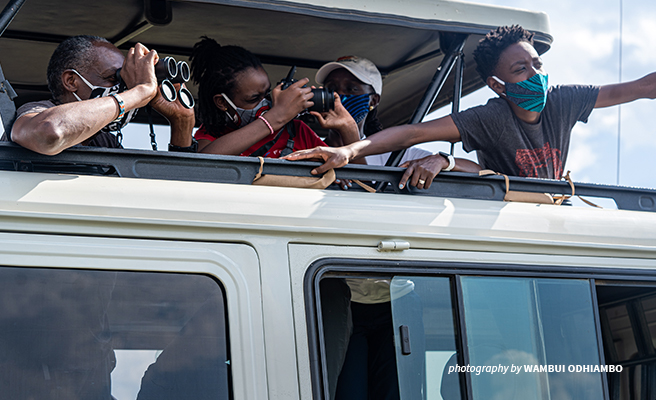AWF Virtual Safaris Bridge Gap in African Tourism Until International Travel Resumes

General Inquiries
Tel:+254 711 063 000
Ngong Road, Karen, P.O. Box 310
00502 Nairobi, Kenya
WASHINGTON, D.C. AND NAIROBI, KENYA (September 28, 2020) – The African Wildlife Foundation (AWF) has been closely monitoring the difficult situation for safari operators in Africa since the outset of the pandemic when travel bans and government closures began impacting protected areas and local communities on the front lines of wildlife conservation. On World Tourism Day, celebrated on September 27 African Wildlife Foundation detailed the ongoing challenges caused by the stoppage of wildlife tourism in conservation areas in African in an opinion piece in The Independent UK and another opinion piece on the fate of tourism after COVID in The East African Standard Newspaper
In April, AWF convened a meeting of 12 CEOs of leading safari companies operating in Africa to update the impact of COVID-19 on their core business operations, threats to wildlife conservation areas (including food security), and the best ways for organizations like ours to assist the tourism industry to help keep wildlife protected and livelihood afloat in local communities that rely on tourism. We knew from the outset that an abrupt and total collapse of the safari tourism industry in Africa was taking place continent-wide.
The tourism industry has never dealt with an economic blow of this magnitude and duration before. Our largest overarching concern during the ongoing pandemic is that people in wildlife communities, who typically gain from tourism dollars, will loosen their commitment to conservation behaviors as they seek alternatives to provide for their families, and that three decades of conservation progress may now be in retreat.
AWF Safari Program Manager Carter Smith said: “During our process of identifying how to assist our partners in the safari industry, we recognized the opportunity to share the information with donors through virtual safaris. Many tourists have been introduced to the concept of virtual safaris – to experience wild animals and wildlands from the comfort of an arm chair. Our blue print was to reverse-engineer events to help both the safari-goers, who are grounded from international travel, and the communities in Africa on the front lines of wildlife conservation.”
In order for virtual safaris to truly benefit both sides of the equation, they need to give participants an insider’s view to the wildlife conservation work on the ground, and introduce them to the heroes who are working tirelessly to defend Africa’s wildlife and wildlands. By pivoting to virtual safaris, wildlife tourists have a chance to hear stories of perseverance, develop meaningful connections, and learn how they can engage and support the communities and field programs protecting wildlife directly.
AWF is engaging its donors though virtual safari offerings and offer them tangible takeaways as to how their donations support livelihoods and wildlife. The virtual safari-goers can go on a game drive and chat with their guide or meet a ranger on a patrol with one of our sniffer dogs all from their living room. We liken it to a fireside chat. These are not webinars. They are an enriching cultural experience, which is also informative and entertaining.
Carter Smith said: “We’re designing virtual safari series around our 2021 safari portfolio to showcase our group safaris and will launch in October. Our guests will be transported to safaris in Uganda, Tanzania and Zimbabwe. There will be local guides on each safari as well as our Country Directors to speak about the programmatic and emergency response work we are doing in each country.”
About African Wildlife Foundation
The African Wildlife Foundation is the primary advocate for the protection of wildlife and wild lands as an essential part of a modern and prosperous Africa. Founded in 1961 to focus on Africa’s conservation needs, we articulate a uniquely African vision, bridge science and public policy, and demonstrate the benefits of conservation to ensure the survival of the continent’s wildlife and wild lands.
MEDIA CONTACTS: To arrange interviews with Carter Smith, AWF Safari Program Manager and other AWF experts working on virtual safaris during COVID-19, please contact Patrick Mitchell of AWF at [email protected], (202) 991-7508 or Nashipae Orumoy of AWF in Nairobi, Kenya at [email protected], +254 701 864021.